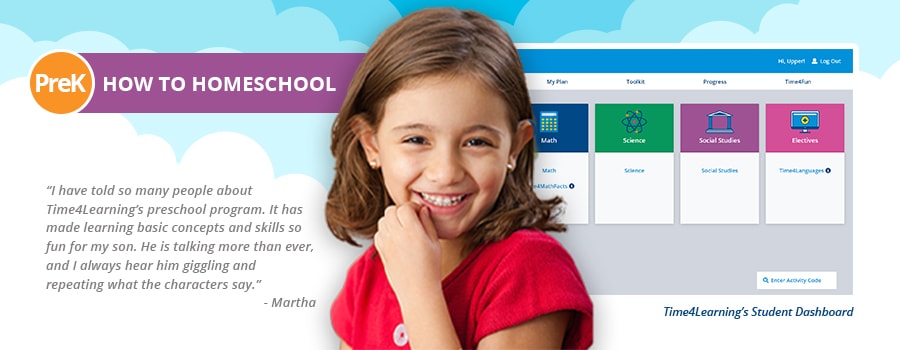How to Homeschool Preschool
If you will be homeschooling PreK in the near future, it’s important to do sufficient research to ensure that your young learner starts off their academic career on the right foot. At this age, preschoolers are very observant, eager to learn, and very curious about the world around them. Taking advantage of that enthusiasm can help you instill a love of learning early on and inspire them to be lifelong learners.
This page provides tons of helpful information on how to homeschool preschool children. You’ll find tips and advice on schedules, subjects and learning objectives, book recommendations, and more.
- How to Homeschool Preschool
- What Schedule is Best for a Preschooler?
- What Subjects Are Taught in Preschool?
- Preschool Learning Objectives
- Reading Book List for Preschool
- Preschool Homeschooling Tips & Ideas
- How Time4Learning Can Help You Homeschool Your Preschooler
- Additional Preschool Homeschool Resources
How to Homeschool Preschool
To begin homeschooling preschool you can follow the steps below.
- Find out what your state’s homeschooling requirements are
- Start learning what your child’s preferred learning style is
- Research the different curricula options
- Set goals for your child and create a homeschool schedule
- Calculate your homeschooling costs based on your budget
- Monitor your child’s progress on a regular basis
- Include fun in your schedule like field trips, hands-on activities, etc
As a Time4Learning member, you’ll have access to our preschool lesson plans which provides detailed information on every lesson within our curriculum.
What Schedule is Best for a Preschooler?
When homeschooling preschool, it’s important to not overwhelm your young learner with too much information all at once. For a PreK student, it’s ideal to homeschool for an hour and a half to no more than two hours. Whether you find it best to homeschool in the morning or afternoon, or perhaps even breaking up your homeschool day into 15-20 minute increments, the choice is yours. Find what works best for your child and make any necessary changes along the way.
Homeschooling Planner
Start planning out your homeschooling days with this free easy to use daily planner.
What Subjects Are Taught in Preschool?
Below is a list of subjects that are typically taught when homeschooling PreK. To find out if you are required to teach any specific subjects, it’s important that you check your state’s homeschooling requirements.
- Math
- Language arts (phonics, reading, writing)
- Science
- Social studies
- Art (drawing, coloring, arts & crafts)
- Physical education (PE)
In addition to this list, homeschoolers can also add any other subjects they feel their children will benefit from such as health, music, and foreign languages, just to name a few.
Preschool Learning Objectives
At this age you’ll want to set not just academic but cognitive and developmental goals as well. Ensuring your child learns all the necessary concepts and gains all the necessary skills will set them up for success in kindergarten and in life!
Your PreK homeschooling goals can look something like this:
- Visually identify all the letters of the alphabet, their order and their sounds
- Distinguish between uppercase and lowercase letters
- Demonstrate an understanding and appreciation of differences in people
- Identify different colors and basic shapes
- Using listening skills to match words that rhyme
- Shows creativity and imagination
- Count in order and recognize numbers
- Know the order of the days of the week and different times of day (morning, afternoon, etc.)
Reading Book List for Preschool
Reading to your preschooler should be a daily routine. Although most students this age are not yet reading, they are gaining valuable skills in literacy and communication as you read to them. These skills will help them begin to recognize sounds, learn new words, and grasp basic concepts of reading comprehension.
Below are a few books that are ideal for homeschooling preschool.
- The Day the Crayons Quit by Drew Daywalt
- Richard Scarry’s What do People do All Day? by Richard Scarry
- Chicka Chicka Boom Boom by Bill Martin, Jr. and John Archambault
- Guess How Much I Love You by Sam McBratney
- We’re Going on a Bear Hunt by Michael Rosen
The Time4Learning preschool curriculum includes tons of stories with colorful graphics that are read aloud to students to help them gain valuable literacy skills.
Preschool Homeschooling Tips & Ideas
Homeschooling preschool is an exciting time to not only bond with your child, but also watch them grow as they learn new skills. Below are some tips that will help you make the most of this time and ensure that your child stays motivated and has a fun year.
Read together every day. Reading with your child benefits them in so many ways. Not only is it a great opportunity to spend time together, but it also helps them learn important literacy skills in communication, comprehension, vocabulary, and so much more. Aim for 15-20 minutes every day.
Don’t forget the importance of play. Schedule breaks for play time. Whether you head out to the park, backyard, or even at home with their toys, playing gives children the opportunity to be creative, use their imagination, improve fine and gross motor skills, gain problem solving skills, and more.
Let your child help around the house. At this young age, children are very eager to act like grown ups and help around the house. Showing them how to do things like folding a small blanket, tidying up their room, and even taking care of pets will make them feel valued and appreciated, not to mention help them gain significant life skills.
Use technology to help them learn. Technology is all around us, and even from an early age kids seem to have a knack for using computers, tablets, and phones. Being computer literate will help children tremendously now and in the future. Give your child a head start by using an online program like Time4Learning. Doing so will help them become familiar with a keyboard, mouse, and other components as well as different programs and software.
Go on field trips. Enhance what your child is learning online and bring lessons to life by going on field trips on a regular basis. No matter where you live, there are educational opportunities just about anywhere. You can learn about nature by going for a walk at your local park, explore science and art at museums, come eye-to-eye with animals at the zoo, and so much more.
Use toys to teach. Chances are, you have toys all over your house. Use them as manipulatives for math or to build reading skills. Dolls and stuffed animals can be used to teach social skills, puzzles are great for building fine motor skills, and board games can help with good sportsmanship and taking turns.
How Time4Learning Can Help You Homeschool Your Preschooler
States do not usually have laws regarding homeschooling preschool, so this is a wonderful time to just have fun learning together. While your homeschool routine should be very relaxed, ensuring that toddlers know to expect activities at certain times of the day is key.
With Time4Learning your homeschool PreK curriculum can be as involved or as simple as you want it to be. Our flexible, comprehensive curriculum gives students a solid foundation in all core areas, helping prepare them to learn more advanced concepts in the years to come.
Below are some of the features and benefits you’ll have access to when you sign up.
- 24/7 access so students can log in and learn on their schedule
- Student-paced approach works with various learning styles as well as students with special needs
- Flexibility to repeat lesson and change grade levels at any time
- Detailed scope and sequence allows you to see what your child will be learning and when
- Simple-to-follow format is presented in a suggested sequence that builds on itself
- Variety of activity types provides a well-rounded approach to learning and includes matching, ordering, coloring, and more
- Colorful, animated characters and catchy songs motivate students, help them retain information, and keep them engaged







